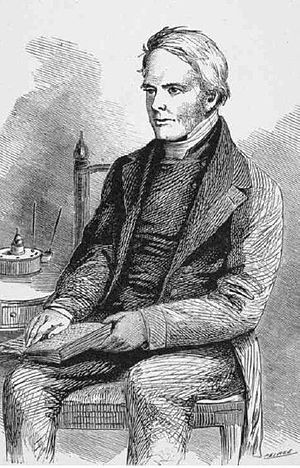There is something about this song! Truly, “we will never be the same!” One encounter… one taste… nothing is ever the same again.
Author Archives: blgriffith
James Vincent McMorrow
I’m sure plenty of people have already heard of and either like to dislike (or perhaps are ambivalent toward) James Vincent McMorrow, but I just discovered him and think he is just great. Take a listen to this song – along with the video.
A Year in New York
A Year in New York from Andrew Clancy on Vimeo.
Reality from OWS
Primitive Tradition
“Therefore the idea of primitive tradition is not only a preservative idea, but a quest for reform. It is a demand for the restoration of, or re-emphasis upon, those beliefs or practices approved or authorized by antiquity but wanting or fragmentary in the present age.

Image via Wikipedia
“‘Is there not a hope’, asked Keble, ‘that by resolute self-denial and strict and calm fidelity to our ordination vows, we may not only aid in preserving that which remains but also may help to revive in some measure, in this or some other portion of the Christian world, more of the system and spirit of the apostolical age? New truths, in the proper sense of the word, we neither can nor wish to arrive at. But the monuments of antiquity may disclose to our devout perusal much that will be to this age new, because it has been mislaid or forgotten, and we may attain to a light and clearness, which we now dream not of, in our comprehension of the faith and discipline of Christ.”
Writing about John Keble and the Tractarian movememt – Owen Chadwick, “The Spirit of the Oxford Movement: Tractarian Essays;” p.29.

Split Ends…
“A church split builds self-righteousness into the fabric of every new
splinter group., whose only reason for existence is that they decide
they are more moral and pure than other brethren. This explains my
childhood, and perhaps a lot about America, too.
“The United
States is a country with a national character of a newly formed church
splinter group. This is not surprising. Our country started as a church
splinter group. The Puritans left England because they believed they were
more enlightened than members of the Church of England, and they were
eager to form a perfect earthly community following a pure theology. They also had every intention of some day returning to England, once
they had proved that something close to heaven on earth could work, and
reforming their “heretical” fellow citizens.
“America still sees
itself as essential and as destiny’s instrument. And each splinter group
within our culture – left, right, conservative, liberal, religious,
secular – sees itself as morally, even “theologically,” superior to
it’s rivals. It is not just about politics. It is about being better
than one’s evil opponent. We don’t just disagree, we demonize the
‘other.’ And we don’t compromise.”
Frank Schaeffer, “Crazy for God;” pp
30-31

5 Cultural Shifts
Interesting, and short, article on cultural changes that we need to pay attention to, particularly if we care about emerging generations and their interest in and involvement in their own spiritual lives and our worshiping communities. Here are a couple paragraphs…
Five cultural shifts that should affect the way we do church
“It’s probably good that most churches aren’t all wrapped up in the latest fads. We don’t have the cash to keep up with most of it, and if we do, we’re probably better off spending that money on feeding the homeless rather than making sure the youth room has the newest flat-screen TV…
“But there are cultural shifts that congregations and church leaders need to track and respond to sensibly. Here are five of them.”
By: Carol Howard Merritt on the Duke Divinity School blog, “Call & Response blog”

Faith was a gift…

Image via Wikipedia
“He [Keble] was altogether out of sympathy with the school of rational theology which treated Christian truth as though it were a philosophy of life, God as though He were a theory to be demonstrated, and faith as though it were the assent of the mind to proven, or to highly probable, propositions. Faith was a gift, its source the Holy Spirit acting through the authoritative teaching of the Church, its medium the sacraments of the Church.”
– Owen Chadwick, “The Spirit of the Oxford Movement: Tractarian Essays;” 1990, p. 24.

Wither the Church
I contend that a primary reason for the withering of the Church within the public mind is resultant of the Church – liberal and conservative – capitulating to the zeitgeist. When we simply mirror the prevailing culture or system whether political, economic, philosophical, whatever, we lose our significance, our voice, our purpose, our justifiable reason to be noticed.
The Real Mission
“It must not be supposed that the Church considers this the fulfillment of its mission [providing good, wholesome opportunities for entertainment, diversion, and leisure in Christian fellowship to help provide for the natural desires and for the benefit of the people]. It is but one of the attempts of the Church to serve the real needs of the community. The real mission of the Church is

Image by Getty Images via @daylife
never lost sight of, that is, to bring individuals into the Kingdom of God and to make them realize their personal relationship with Jesus Christ as their Saviour. The Episcopal Church is not apprehensive of the effect of its social emphasis because it has its foundation most firmly rooted and does not distrust its people. It believes that social service is a natural outcome of its fundamental principles. Its whole structure is comprehensive and not exclusive.
“The Church’s message truly presents vision of that greater democracy for which the righteous nations of the earth are yearning. It is a democracy whose fundamentals are justice, righteousness and the abundant spirit of service that will secure for the people what no form of economic democracy will ever achieve. For nations seeking national and social salvation from the ills that afflict them, as well as for individuals, Jesus is the Way, the Truth, and the Life. The Gospel of Christ is the only national Character of Liberty that can guarantee national salvation, the only power equal to the task of exalting a nation. The Church presents this Gospel.”
George Parkin Atwater, “The Episcopal Church: Its Message for Men Today,” 1950, pp. 167-168. (Originally published in 1917)
——————————————-
I think we all too often let everything else usurp the “Real Mission.” Frankly, the real mission isn’t politically-correct and is disconcerting to many, yet life to so many others. If we, as the Church, are a unique organization offering real and honest alternatives (not just for the sake of offering alternatives, for then we are resigning our responsibility), then there must be something alternative about us.
If the “Kingdom of God” is a real thing, it must be evident in the lives of those who claim to be citizens of such a Kingdom. If the image of such a Kingdom is not evident in the lives of the citizens of the Kingdom, then what use is it as a real alternative? It isn’t, and that’s why far too many people – particularly younger people – no longer consider the Church or Christianity as viable for or pertinent to their own lives. We too often give up our real mission for the sake of expediency or popularity. As a result, all too often those who claim to be citizens of the Kingdom of God no longer reflect the high values of the Kingdom. Too often, we are usurped by socio-political ideology whether conservative or liberal, the lust for power, and greed (among lots of other things).
The way to realize such an alternative for the good is not easy, is not particularly popular, and as such is ignored, ridiculed, and rejected by many. Yet, the real mission of the Church is to call people to this Kingdom recognizing that we are imperfect, but our own imperfection does not change the way for realization of the Kingdom. Here, we proclaim, is the path to the Kingdom of God, born by the work of Jesus Christ, already realized by multitudes from the vast array of cultures and peoples over centuries – we proclaim this truth to all who wish to follow. We are on our way and extend the invitation to all who wish to join us.
Is it real, this Kingdom, this life? Only our experiences within it and the image of God revealed through us by way of such experiences will tell.


